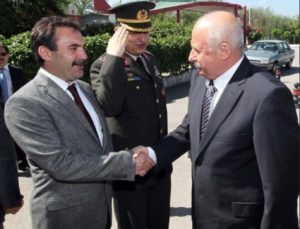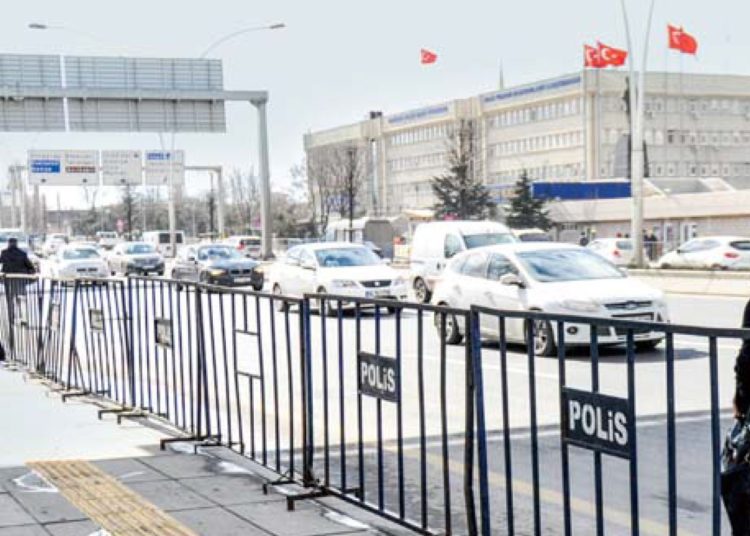Abdullah Bozkurt/Stockholm
Secret orders issued by a police chief in Turkey’s capital city of Ankara to protect US, NATO and Israeli targets from impending terrorist attacks were listed as criminal evidence against him in a sham trial, documents obtained by Nordic Monitor have revealed.
Hami Güney, deputy provincial police chief in charge of intelligence in Ankara, issued two secret orders after intelligence gathered suggested possible terrorist attacks on various targets in Turkey including buildings used by US, NATO and Israeli officials. The first order was circulated on October 11, 2012 and warned that militant Marxist-Leninist organization the Revolutionary People’s Liberation Party/Front (DHKP/C) had been planning to attack multiple targets including NATO and US officials, among others.
The order, classified as need-to-know only, stated that intelligence was picked up indicating the top leadership of the terrorist group had instructed cells to identify possible targets for an attack, gather information and run surveillance that would help the militants complete their assignments. The police chief ordered all district police departments in Ankara to review existing security measures, deploy additional units to beef up security where needed and asked them to put more emphasis on intelligence to prevent the attacks from taking place.
Order on DHKP/C terrorist plot against US and NATO officials in Turkey:
The police chief’s concerns, unfortunately, were realized when a DHKP/C militant attacked the US Embassy in Ankara, killing two people, including the assailant, and critically injuring a Turkish journalist, on February 1, 2013. The explosion occurred inside the security checkpoint at the side entrance to the US Embassy where the suicide bomber detonated an explosive device. A guard standing outside the checkpoint was killed.
The DHKP/C is listed as a terrorist organization by Turkey, the United States and the European Union. Turkey’s notorious intelligence agency MIT has reportedly long been working closely with the leadership of the DHKP/C and is believed to have directed some attacks to benefit the government of President Recep Tayyip Erdoğan.
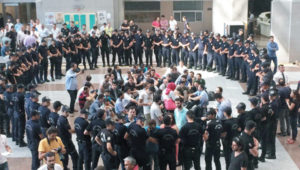
The second order, issued by Güney on the same day, concerned a possible terrorist attack on Israeli and Jewish targets in Ankara. He wrote that the intelligence picked up by Turkish police indicated that Iran had been preparing attacks on Israeli and Jewish figures. He noted that a threat assessment based on intelligence was made and warned that Israeli diplomats, Jewish rabbis and officials of Jewish schools and their families could be targeted in the terrorist plot.
Secret order by Hami Güney, who asked for extra vigilance against a terrorist attack plotted by Iran against Israeli diplomats and Jews in the Turkish capital:
The police chief asked for extra caution and vigilance in protecting Israeli diplomats and Jewish figures, ordered a review of existing security measures and the provision of additional protection when needed.
Güney’s career was dealt a huge blow in the aftermath of 2013 corruption investigations that incriminated Erdoğan and his family members. In order to punish investigators who exposed the dirty laundry he and his family were involved in, Erdoğan launched a massive campaign of suspensions and a reshuffling of the police department, the main law enforcement in Turkey with some 300,000 officers, and hushed up ongoing probes that implicated him and his associates. Many veteran police chiefs including Güney were arbitrarily dismissed and/or jailed on fabricated charges.
In fact, both orders he signed to counteract possible terrorist plots were listed as criminal evidence against him in investigation file No.2015/126342, which claimed the police chief was trying to topple the Erdoğan government without offering any proof that he was actually involved in such an attempt. Instead the two orders he signed concerning possible terrorist attacks were presented as evidence of a crime against him.
Documents he signed to obtain wiretap and surveillance authorizations from the courts in a confidential investigation into the Turkish network of the Islamic Revolutionary Guard Corps (IRGC) Quds Force, known as Tevhid Selam, were also presented to the court as if he had committed a criminal offense by doing what he was supposed to do. He was asked why he had sought surveillance of Iranian diplomat Sayed Asghar Seyedtorabi and his Turkish assets who were suspected of running clandestine operations and plotting terrorist attacks in Turkey in 2012.
In 2014 the Erdoğan government suspended him and others who were involved in the investigation into the Quds Force cells, but he won against the government in a civil case in which the judges ruled for his reinstatement in January 2015.
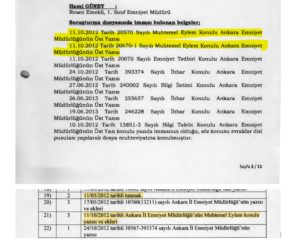
In March 2015 he was detained on fabricated charges of running illegal wiretaps which were in fact authorized by the courts and in line with the Code on Criminal Procedure. Everything was by the book. He was released at the first hearing, but the judges imposed a flight ban and ordered him to check in with the local police on a regular basis. A year later, the government came after him again, this time on coup plotting charges but failed to present any evidence linking him to a July 15, 2016 attempted coup.
During his arraignment on July 17, 2016 he told the judge he had fulfilled his duties as deputy provincial police chief and signed the orders as part of his job. He denied accusations that he was involved a plot to oust the government. However, judge Atila Özturk ruled for his arrest pending trial.
He was convicted and sentenced to prison in January 2020 after a sham trial that lasted for several years.
The Quds Force investigation listed a number of Iranian and Turkish nationals, some operating under diplomatic cover, as suspects. Some had already been convicted for their ties to the Quds Force, served time and were later released in an amnesty facilitated by the government of then-Prime Minister Erdoğan in 2004.
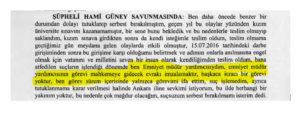
In February 2014 the Istanbul prosecutor was about to wrap up the probe and indict the suspects in what was described by law enforcement officials as the most comprehensive espionage investigation in Turkey’s history. Some 200 operatives were identified including Quds Force generals who were in Turkey to run clandestine operations and support terrorist networks. However, the Erdoğan government was informed about the probe pursued by the judicial branch and unlawfully stepped in to quash the investigation into the Quds Force.
The Quds Force investigation, which was expanded to encompass government officials, including two chief aides of President Erdoğan, was branded as a hoax by Erdoğan and his cabinet members. Many of the police chiefs and prosecutors who were part of the Quds Force investigation remain in jail. In some cases, the spouses of the officials were also jailed by the Erdoğan government to send a message to law enforcement agencies and the judiciary that Iran’s operatives in Turkey can act with impunity.
